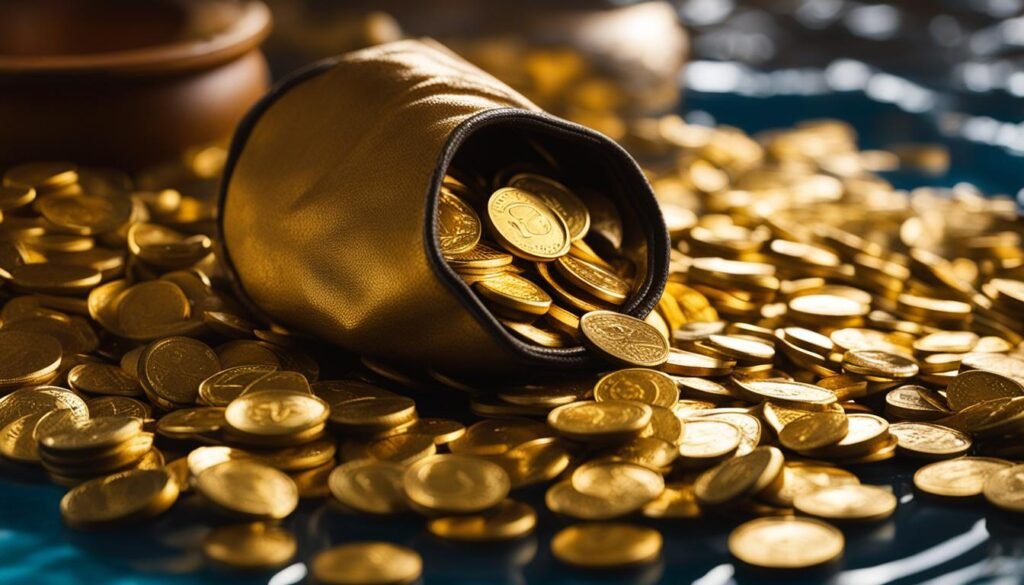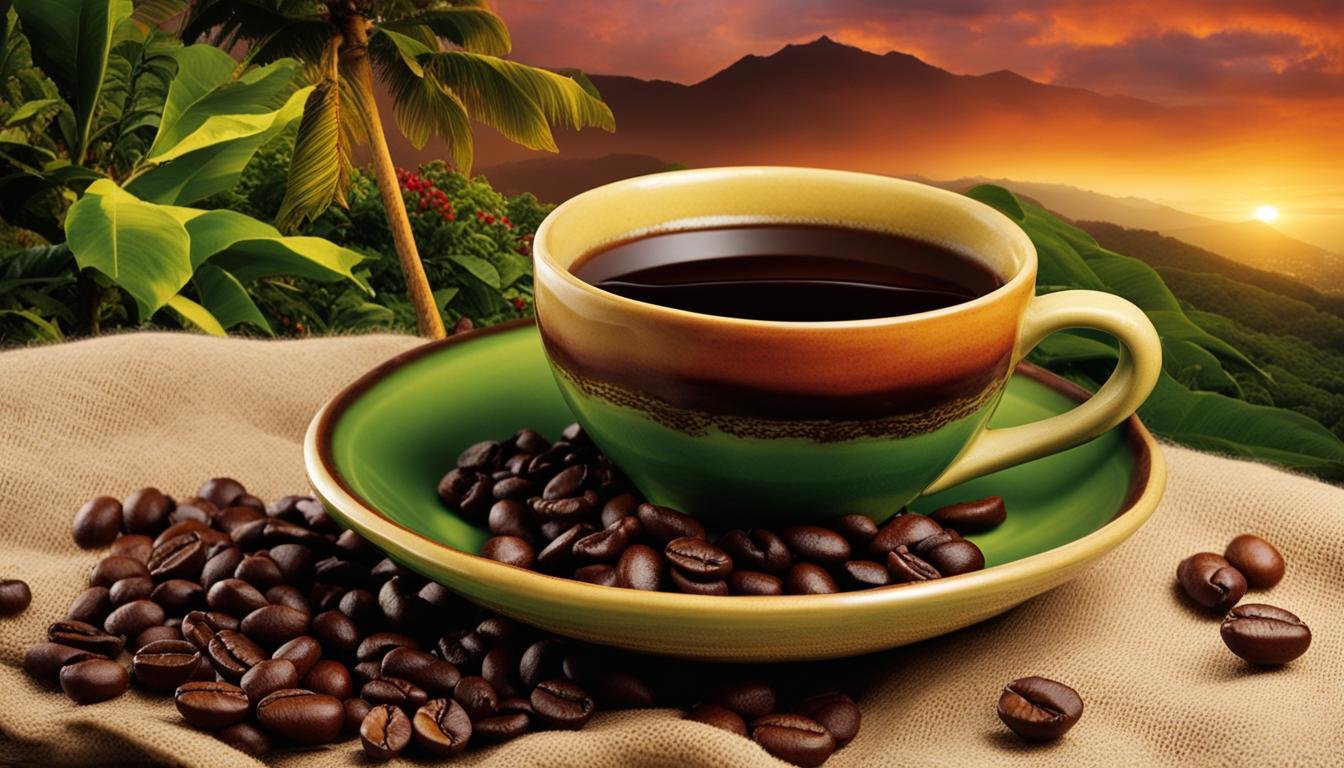Kona coffee is a highly revered and sought-after variety of coffee that is grown exclusively in the Kona district of Hawaii’s Big Island. Renowned author Mark Twain once described Kona coffee as having a “richer flavor than any other.” To understand what makes Kona coffee special, it’s important to explore its history, production process, and unique flavor profile.
Key Takeaways:
- Kona coffee is a highly sought-after variety of coffee grown in Hawaii’s Kona district.
- Kona coffee has a rich history that dates back to the early 19th century.
- Kona coffee’s unique characteristics are influenced by its prime farming location and careful production processes.
- Kona coffee is considered one of the most expensive coffees in the world due to its rarity and labor-intensive harvesting methods.
- When purchasing Kona coffee, look for the “100% Kona Coffee” label to ensure authenticity.
The History of Kona Coffee
Kona coffee has a fascinating history that dates back to the 19th century. It all began in 1817 when horticulturist Don Francisco de Paula Marin first attempted to grow coffee beans in Hawaii. However, it wasn’t until 1828 when Samuel Ruggles successfully introduced coffee to the Kona district of Hawaii’s Big Island. Coffee farming faced challenges in the 1850s due to inclement weather and pests, but it made a comeback in 1892 when Hermann Widemann introduced the Guatemalan Typica coffee bean to the region.
Over the years, Kona coffee production experienced ups and downs in popularity. Its demand surged during World War II but later fluctuated. In response to fraudulent labeling practices, strict certification laws were established to ensure the authenticity of Kona coffee. These regulations safeguard the integrity of this exceptional Hawaiian coffee. Today, Kona coffee continues to be cherished for its rich history and distinctive flavor.
The Rise and Fall
Throughout its history, Kona coffee has seen both moments of glory and challenges. From the early pioneers who first planted coffee trees in the rich volcanic soil to the resurgence of coffee production after setbacks, the story of Kona coffee is one of resilience and passion. Learn more about the ups and downs in Kona coffee’s journey below:
1828: Samuel Ruggles successfully introduces coffee to the Kona district.
1850s: Coffee farming faces challenges due to inclement weather and pests.
1892: Hermann Widemann introduces the Guatemalan Typica coffee bean to Kona, revitalizing coffee production.
The Impact of Certification
To preserve the quality and authenticity of Kona coffee, strict certification laws were enacted. These regulations ensure that coffee labeled as “Kona” is indeed grown in the Kona district, meeting specific quality criteria. The certification process includes rigorous inspections and lab tests to verify the origin and quality of the coffee beans. This certification system protects both consumers and the reputation of Kona coffee, allowing coffee lovers to savor its unique taste with confidence.
Now that we’ve explored the history of Kona coffee, let’s delve into its unique characteristics that contribute to its exceptional flavor profile.
The Unique Characteristics of Kona Coffee
When it comes to Kona coffee, its unique characteristics set it apart from other varieties. The flavor profile of Kona coffee is truly exceptional, thanks to its origin and production methods.
Origin and Farming
Kona coffee thrives in the Kona Coffee Belt, which encompasses the slopes of Hualalai and Mauna Loa on Hawaii’s Big Island. The volcanic soil in this region is rich in nutrients and minerals, providing the perfect environment for coffee plants to grow. The combination of sunny mornings, mild nights, and afternoon rainfall creates optimal conditions for the cultivation of high-quality coffee beans.
Hand-Picked and Carefully Processed
During the harvest season, which typically runs from August to December, the coffee beans are hand-picked to ensure only the ripest cherries are selected. This labor-intensive process guarantees the highest quality beans for Kona coffee. After harvesting, the beans undergo meticulous processing, including fermentation, drying, milling, and polishing. Each step is carefully executed to preserve the unique flavors and aromas of Kona coffee.
Distinct Flavor Profile
The result of this meticulous production process is a cup of Kona coffee with a distinct flavor profile. Kona coffee is known for its bright, clean taste, with hints of honey, brown sugar, fruit, and milk chocolate. The aroma is often described as a delightful mix of butter, cocoa, and caramel. These flavors and aromas combine to create a truly memorable and enjoyable coffee experience.
Next, we will explore the price and rarity of Kona coffee, which contribute to its status as one of the most sought-after and exclusive coffees in the world.
The Price and Rarity of Kona Coffee

Kona coffee is renowned for its exceptional quality and unique flavor profile, but what sets it apart is its price and rarity. Due to various factors, Kona coffee is considered one of the most expensive coffees in the world.
One of the key reasons for its high price is the meticulous hand-picking process involved in harvesting Kona coffee beans. Unlike mechanized coffee harvesting methods, which are common in other parts of the world, Kona coffee farmers carefully select and pick the ripest coffee cherries by hand. This labor-intensive process increases the production costs, making Kona coffee pricier compared to other varieties.
Furthermore, the limited availability of Kona coffee adds to its exclusivity and premium price tag. Kona coffee is grown exclusively in the Kona district of Hawaii’s Big Island, making up only about 1% of the global coffee industry. The combination of its unique growing conditions, including the volcanic soil and tropical climate, along with strict certification requirements, contributes to its rarity.
As a result, Kona coffee has become a highly sought-after commodity among coffee enthusiasts, contributing to its premium price. The rich volcanic soil and favorable climate of the Kona Coffee Belt, coupled with the meticulous harvesting and limited production, result in a truly exceptional coffee experience.
Conclusion
Kona coffee has captured the hearts of coffee enthusiasts around the world, earning rave reviews for its exceptional quality and distinct flavor profile. Its rich history, unique characteristics, and premium status make it a true gem in the coffee world.
When indulging in the delights of Kona coffee, it is crucial to seek out the “100% Kona Coffee” label to ensure authenticity. This guarantees that you are getting the pure, unadulterated flavor that Kona coffee is known for.
There are several esteemed Kona coffee brands to choose from, each with its own unique flavor nuances. From the bright and clean taste with hints of honey, brown sugar, fruit, and milk chocolate, to the delightful aroma of butter, cocoa, and caramel, experiencing the flavors and aromas of Kona coffee is truly a memorable and enjoyable experience.
So, if you’re in search of an indulgent and extraordinary cup of coffee, look no further than Kona coffee. With its impeccable reputation, loyal following, and exceptional flavors, Kona coffee is sure to satisfy even the most discerning coffee connoisseur.
FAQ
What is Kona Coffee?
Kona coffee is a highly revered and sought-after variety of coffee that is grown exclusively in the Kona district of Hawaii’s Big Island.
What is the history of Kona Coffee?
The first attempts to grow coffee beans in Hawaii were made in 1817, but it was not until 1828 when Samuel Ruggles successfully introduced coffee to the Big Island’s Kona district. Kona coffee production has faced challenges and fluctuations in popularity over the years.
What makes Kona Coffee unique?
Kona coffee’s unique characteristics are influenced by its prime farming location, volcanic soil, and careful production processes. The coffee beans are hand-picked and undergo careful processing, resulting in a distinct flavor profile.
Why is Kona Coffee expensive?
Kona coffee is considered one of the most expensive coffees in the world due to factors such as its hand-picking process, limited availability, and strict certification requirements.
Where can I find Kona Coffee brands?
There are various Kona coffee brands available, each with its own distinct flavor profile. Look for the “100% Kona Coffee” label to ensure authenticity.

Leave a Reply